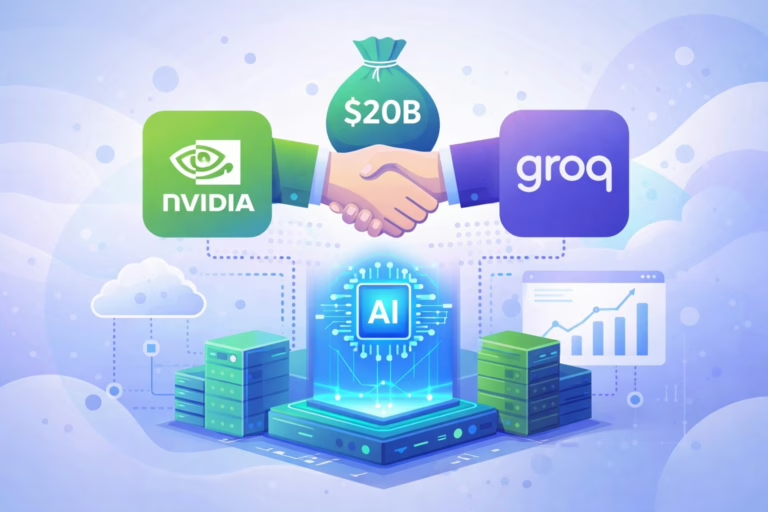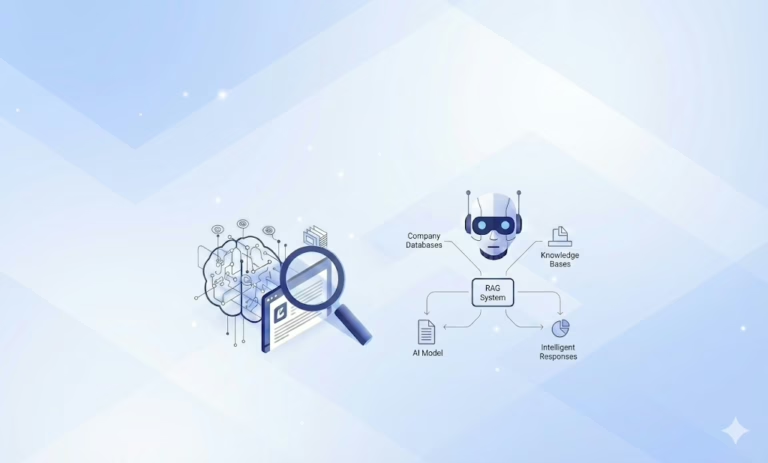As the digital age progresses, businesses find themselves at a pivotal intersection where technology meets opportunity. The rapid advancement of artificial intelligence (AI) and automation is reshaping industries, creating unprecedented possibilities for innovation and efficiency. This new frontier isn’t just about adopting new tools; it’s about fundamentally transforming how organizations operate.
AI is not a mere trend; it’s a crucial component that enhances productivity, optimizes resources, and facilitates data-driven decision-making. With automation taking over routine tasks, businesses can focus on strategic initiatives that drive growth, save costs, and improve customer experiences. Understanding key AI sub-technologies such as machine learning, natural language processing, and predictive analytics is essential to fully grasp the impact of this revolution.
In this article, we will delve into the significance of AI and automation in business, exploring real-world applications, the benefits and challenges of implementation, and strategic approaches to adoption. Join us as we navigate the landscape of this business revolution and discover how embracing AI can be a game-changer for your organization.
Significance of AI and Automation in Business
Artificial Intelligence (AI) and automation are changing how businesses operate. They streamline repetitive and routine tasks, boosting operational efficiency. Automation can reduce human error, allowing businesses to save on operational costs.
AI-powered chatbots enhance customer service. They handle customer interactions in real time, improving customer satisfaction and experiences. These chatbots provide support 24/7 and manage complex tasks seamlessly.
Machine Learning and predictive analytics play a pivotal role in data-driven decision-making. They offer valuable insights into market trends, helping businesses make informed decisions. This predictive power provides a competitive edge by anticipating customer needs.
Artificial intelligence also transforms supply chain operations. Robotic process automation ensures seamless integration, optimizing inventory management. Monitoring inventory levels through AI reduces wastage and costs.
A closer look at the benefits:
Benefits of AI and Automation in Business |
|---|
Improved customer experiences |
Reduced operational costs |
Enhanced operational efficiency |
Minimization of human error |
Increased competitive edge |
AI and automation revolutionize business models by delivering actionable insights. They empower companies to adapt, innovate, and thrive in a dynamic market. The integration of these technologies ensures businesses remain agile and efficient.
How AI Enhances Productivity
Artificial intelligence is transforming how we work. By taking on tasks that are repetitive or routine, AI allows workers to focus on more complex processes. This leads to increased productivity and efficiency in various sectors.
Automation of Routine Tasks
AI and automation take care of routine tasks effortlessly. This includes handling repetitive work, reducing the chance of human error. By automating such tasks, businesses find they can cut down on operational costs and improve their output. Robotic process automation is particularly beneficial in managing tasks quickly and accurately.
Data-Driven Decision Making
Data is key to informed decisions. AI tools offer valuable insights by analyzing data and predicting market trends. Predictive analytics guide businesses to make decisions based on real-time data. This not only provides a competitive edge but also aligns businesses with customer needs swiftly and effectively.
Improved Resource Allocation
AI helps companies allocate their resources more wisely. By using data-driven insights, businesses can adapt efficiently. They can monitor inventory levels and optimize supply chain operations, reducing wastage. As resources are managed better, operational efficiency improves, making the company more productive.
AI is redefining business strategies by enhancing productivity, improving decision-making, and refining resource use. These advancements create an environment where businesses can thrive competitively.
Key AI Sub-Technologies
Artificial intelligence is transforming how businesses operate. Key sub-technologies like Machine Learning, Natural Language Processing, and Predictive Analytics play a critical role. They enable businesses to work smarter and more efficiently, enhancing customer experiences and providing valuable insights. Understanding these sub-technologies can help companies gain a competitive edge.
Machine Learning (ML)
Machine Learning (ML) allows machines to learn from data and improve over time. It automates routine tasks and reduces human error. By analyzing market trends, ML helps in making data-driven decisions. Businesses use ML for inventory management, monitoring inventory levels, and improving supply chain operations. This leads to operational efficiency and reduced operational costs.
Natural Language Processing (NLP)
Natural Language Processing (NLP) enables machines to understand human language. It is key for enhancing customer interactions and improving customer satisfaction. AI-powered chatbots and AI-driven chatbots use NLP to provide real-time customer service. These bots handle repetitive tasks, freeing up human agents for more complex tasks. This creates seamless integration between technology and customer experiences.
Predictive Analytics
Predictive Analytics uses data to forecast future outcomes. It helps businesses make informed decisions by providing actionable insights. This sub-technology identifies patterns that might not be obvious otherwise. By understanding potential future scenarios, businesses can optimize complex processes and adapt their business models accordingly. Predictive Analytics ensures that companies stay ahead by aligning with market trends.
AI Sub-Technology | Key Benefits |
|---|---|
Machine Learning (ML) | Automates tasks, reduces errors, enhances decisions |
Natural Language Processing (NLP) | Improves customer service, streamlines interactions |
Predictive Analytics | Offers foresight, informs strategic decisions |
These sub-technologies revolutionize business by providing AI-powered tools for efficiency and insight, driving progress in the digital age.
Integration with Robotic Process Automation (RPA)
Integrating Robotic Process Automation (RPA) is reshaping business operations. RPA uses software robots to perform repetitive and routine tasks that would otherwise require human effort. This technology reduces human error and boosts operational efficiency.
Benefits of RPA Integration:
- Reduced Operational Costs: Automating tasks cuts down on labor expenses.
- Improved Customer Service: Freed-up staff focus on enhancing customer experiences.
- Increased Accuracy: With RPA, tasks are done with exactness, minimizing mistakes.
- Enhanced Productivity: Employees can devote time to complex tasks, driving innovation.
Consider a company’s inventory management system. With RPA, real-time inventory levels can be monitored and adjusted automatically, ensuring seamless supply chain operations.
RPA Benefits | Impact on Business |
|---|---|
Reduced Labor Costs | Lower operational costs |
Error Minimization | Increased process accuracy |
Time Efficiency | Focus on strategic, complex tasks |
RPA also supports data-driven decision-making by offering valuable insights quickly. When integrated with AI, it enables businesses to follow market trends more closely, providing a competitive edge.
Incorporating RPA is an efficient way to streamline processes, yielding actionable insights and informed decisions, ensuring businesses thrive in today’s fast-paced market.
Real-World Applications
Artificial Intelligence (AI) and automation are transforming industries. By redesigning core processes, businesses are better equipped to meet evolving customer demands. Automation is more than a buzzword—it’s a necessity. Companies using AI see improvements across various functions, including customer interactions, inventory management, and marketing strategies.
Customer Service Innovations
AI-powered chatbots are revolutionizing customer service. These bots handle customer queries in real-time, offering quick and accurate responses. This innovation leads to higher customer satisfaction and improved customer experiences. Moreover, chatbots free up human staff to tackle more complex tasks, thus optimizing overall service delivery.
Key Benefits of AI in Customer Service:
- 24/7 Availability: Ensures constant customer support.
- Quick Response Times: Reduces wait times, enhancing satisfaction.
- Consistency: Provides uniform answers, minimizing human error.
Supply Chain Management Enhancements
Automation is critical in strengthening supply chain operations. With real-time monitoring of inventory levels, businesses can make data-driven decisions. This precision keeps the supply chain seamless and efficient. AI also aids in predictive analytics, allowing companies to anticipate market trends and adjust inventory accordingly.
Supply Chain Improvements:
- Real-Time Monitoring: Ensures accurate inventory levels.
- Seamless Operations: Reduces disruptions.
- Predictive Insights: Informs proactive strategies.
Supply Chain Benefits | Business Impact |
|---|---|
Accurate Monitoring | Efficient inventory management |
Predictive Analytics | Informed stock decisions |
Seamless Integration | Improved supply chain efficiency |
Marketing and Sales Optimization
AI and automation offer valuable insights into customer behaviors and market trends. Businesses can tailor marketing efforts to target specific demographics, enhancing both reach and customer engagement. Machine Learning algorithms make it possible to identify emerging trends and predict customer needs, helping companies maintain a competitive edge.
Advantages in Marketing:
- Targeted Campaigns: Data-driven decisions boost effectiveness.
- Trend Analysis: Quickly adapt to shifts in market trends.
- Customer Insights: Gain deep understanding for better strategies.
The integration of AI and automation in business contexts leads to smarter decisions, higher operational efficiency, and greater competitive capabilities.
Benefits of AI and Automation
Artificial Intelligence (AI) and automation are transforming how businesses operate. They offer a blend of efficiency, improved customer satisfaction, and strategic advantages. Embracing these technologies can lead to notable advancements in various business areas. Here’s how:
Cost Efficiency
AI and automation significantly reduce operational costs. By handling routine tasks, such as inventory management and data entry, they free up human resources for more complex tasks. This reduction in repetitive tasks lowers expenses and increases productivity. Robotic Process Automation (RPA) also minimizes human error, leading to cost savings.
Cost Efficiency Highlights:
- Reduction in operational costs
- Minimized human error
- Increased productivity
Superior Customer Experiences
AI-powered systems enhance customer interactions, making every experience smooth and personalized. AI-driven chatbots provide real-time responses to inquiries, boosting customer satisfaction. Predictive analytics allow businesses to tailor services to individual preferences, promoting positive customer experiences.
Key Benefits:
- Real-time customer service
- Personalized customer interactions
- Enhanced customer satisfaction
Competitive Advantage
Staying ahead in today’s market requires a competitive edge. AI and automation offer this by providing valuable insights and data-driven decision-making. Businesses can analyze market trends and make informed decisions quickly. The seamless integration of AI into supply chain operations optimizes inventory levels, contributing to improved operational efficiency.
How It Helps:
- Insights into market trends
- Data-driven decisions
- Optimized supply chain operations
AI and automation continue to revolutionize business models, giving companies the tools they need to thrive in a competitive landscape. By embracing these innovations, businesses can achieve increased operational efficiency and sustained growth.
Challenges of AI Implementation
Adopting AI and automation in business is not without its hurdles. These challenges can affect the pace and success of technology integration. Understanding these issues can help companies prepare better strategies for seamless integration.
Data Privacy and Security Concerns
When using AI, data privacy and security become top concerns. AI systems often need vast amounts of data to function effectively. This data must be safeguarded to protect consumer privacy and ensure compliance with regulations. Companies need to balance operational efficiency with robust security measures to minimize risks.
Resistance to Change
Introducing AI can be met with resistance from employees. Many worry that AI will completely change their job functions. Businesses must ensure that they communicate the benefits, such as reduced repetitive tasks, improved customer satisfaction, and streamlined customer interactions. Engaging teams early in the process can help reduce fears and build acceptance.
Skills Gap in the Workforce
AI and automation demand new skills. There is a noticeable gap between the skills people have and those required for AI-driven roles. Companies must invest in training programs to upskill their workforce. This ensures employees can handle complex processes and contribute effectively to the company’s AI-powered initiatives.
Bias in Algorithms
AI systems can sometimes show bias, leading to unfair outcomes. This bias often stems from the data used to train the algorithms. Businesses must work to create diverse datasets and regularly audit their AI systems. This helps reduce bias and ensures fair and accurate decisions that enhance customer experiences.
Job Displacement and Economic Impact
AI and automation raise concerns about job displacement. As AI takes over routine and repetitive tasks, some roles may become redundant. However, AI can also create new opportunities in fields like AI management and Machine Learning. It’s crucial for industries to adapt their business models to harness the full economic potential of AI innovations.
By addressing these challenges thoughtfully, businesses can leverage AI to gain a competitive edge, reduce operational costs, and make informed decisions driven by actionable insights.
Strategic Approach to AI Adoption
Adopting AI in business is no longer a choice but a necessity. A strategic approach helps companies gain a competitive edge. Companies can use AI to achieve greater customer satisfaction and streamline repetitive tasks.
Developing an AI Roadmap
An AI roadmap is essential for seamless integration. It outlines key areas where AI and automation can enhance operations like customer service and inventory management.
- Identify Goals: Define what you want to achieve. This could be reducing operational costs or improving customer experiences.
- Assess Current Processes: Evaluate what systems already exist. Focus on areas involving routine tasks or complex processes.
- Plan for Implementation: Think of AI-powered chatbots to improve customer interactions. Use robotic process automation for mundane tasks.
- Track Progress: Set milestones. Ensure every phase achieves operational efficiency and delivers valuable insights.
Continuous Learning and Improvement
AI technology constantly evolves. Therefore, businesses should embrace continuous learning. This involves using predictive analytics and real-time data to make data-driven decisions.
- Invest in Training: Employees need to adapt to new technologies to handle complex tasks.
- Feedback Loops: Collect feedback from customer interactions to refine AI systems. This helps in minimizing human error and improving overall customer satisfaction.
Key Areas | Examples of AI Application |
|---|---|
Customer Service | AI-driven chatbots |
Supply Chain Operations | Inventory levels |
Decision Making | Predictive analytics |
By incorporating these strategies, businesses can effectively utilize AI for transformative growth and innovation. This approach will lead to better market trend identification and smarter, informed decisions.
Future Trends in AI and Automation
Artificial Intelligence (AI) and automation are reshaping the future of business. They offer a competitive edge by improving customer experiences and reducing operational costs. AI-driven chatbots, for instance, enhance customer interactions by providing real-time support, boosting customer satisfaction.
Businesses are using AI to handle repetitive and routine tasks. This frees up human workers for complex tasks that require creativity and problem-solving. Robotic process automation minimizes human error and speeds up complex processes in supply chain operations and inventory management.
Predictive analytics, powered by Machine Learning, allows companies to make informed decisions. These powerful tools identify market trends and provide actionable insights. Thus, businesses can adapt their business models quickly and efficiently.
Here’s a simple look at how AI is revolutionizing business:
AI and Automation Benefits | Impact |
|---|---|
Reduced operational costs | Higher profitability |
Enhanced customer service | Improved customer satisfaction |
Data-driven decision-making | Informed decisions, less human error |
Efficient inventory management | Optimized inventory levels |
Seamless integration | Better workflow and efficiency |
In summary, AI and automation are vital for modern businesses. They help improve operational efficiency and offer valuable insights, driving success in a competitive environment.
Why Novemind is Your AI Partner
In today’s fast-paced market, businesses need to stay competitive. Novemind helps companies transition to agile operational models using AI and automation. This approach not only boosts efficiency but also ensures continuous innovation.
AI-powered automation is now a strategic imperative. By reducing operational errors, businesses can focus more on innovation. Novemind enables this shift by integrating AI solutions that handle routine and repetitive tasks. These solutions enhance customer satisfaction and improve operational efficiency.
A key advantage of AI is its ability to process large volumes of data swiftly. This helps businesses identify patterns and extract actionable insights.
Benefits of Partnering with Novemind:
- Automate routine tasks
- Enhance customer experiences
- Reduce human error
- Improve decision-making
- Foster innovation
Moreover, Novemind’s AI integration offers seamless solutions like AI-driven chatbots and robotic process automation. These innovations help improve customer interactions and streamline complex tasks.
By choosing Novemind, businesses can enhance productivity and thrive in today’s interconnected landscape. This AI partnership is not just an option; it’s a necessity for future-ready enterprises.




